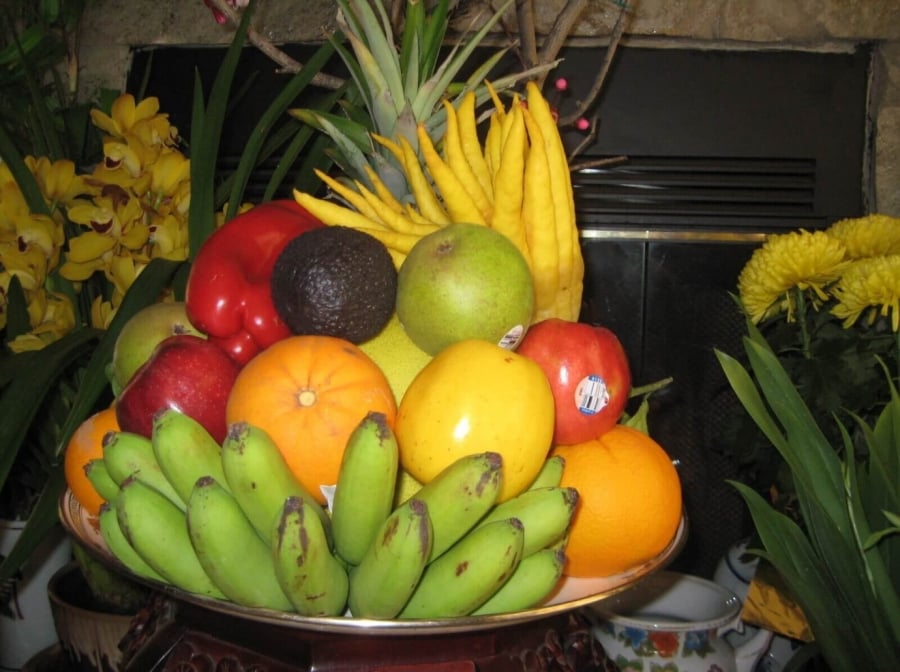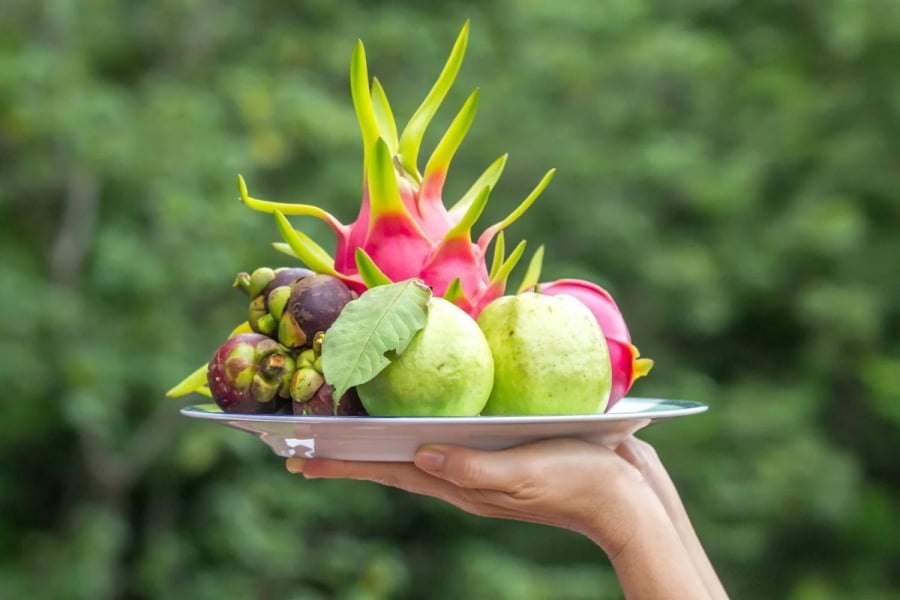In Vietnamese spiritual culture, offering ancestral and divine rituals is a sacred tradition. Every stick of incense burned and every fruit offering arranged conveys piety, gratitude, and reverence for one’s roots.
Is this merely a folk custom, or is there a deeper meaning? Let’s delve into why odd numbers are so favored on these ceremonial fruit trays.

1. Odd Numbers Symbolize Growth and Prosperity
In the Eastern philosophy, odd numbers (1, 3, 5, 7, 9) are associated with Yang energy, representing life, movement, growth, and endless prosperity. Even numbers (2, 4, 6, 8), on the other hand, carry Yin energy, signifying stillness, conclusion, or cessation.
Therefore, when presenting offerings to deities and ancestors, Vietnamese people opt for an odd number of fruits, imbuing their rituals with wishes for a thriving, abundant life, and smooth sailing ahead. The odd-numbered offerings invite positive energy, create a connection with the divine realm, and are believed to bring good fortune and prosperity to the family.
2. Odd Numbers Convey Openness and Infinite Possibilities
In spiritual contexts, odd numbers are believed to signify “openness,” inviting opportunities and paving the way forward. Even numbers, conversely, are associated with “closure” and finality. Thus, on ancestral altars, offerings of 3, 5, or 7 fruits are commonplace, each number symbolizing:
-
3: The harmony of Heaven, Earth, and Humanity (Tam Tài)
-
5: The Five Blessings of Fortune, Official Position, Longevity, Virtue, and Good Health (Ngũ Phúc)
-
7: The sacredness and spirituality of the divine realm
-
9: The utmost representation of singular digits, signifying perfection and eternity
Each odd number carries a positive connotation, akin to a prayer for enduring peace and happiness for one’s family, without interruption.
3. Odd Numbers Demonstrate Sincerity and Attention to Detail
Ancestral rituals are rooted in the belief that sincerity and devotion matter more than the grandeur of offerings. Selecting an odd number of fruits demonstrates this attention to detail and respect for spiritual traditions.
Moreover, choosing odd numbers helps avoid combinations that carry unfavorable connotations in folk beliefs, such as 2 (representing eternal separation), 4 (associated with death), and 6 and 8 (symbolizing wealth and prosperity but in a material sense, which may not align with the pure spiritual intentions of the ritual).
4. Flexibility in Numbers Depending on the Ceremony
However, odd numbers are not an absolute requirement in all circumstances. During significant ceremonies like Lunar New Year, full moon festivals, or death anniversaries, the number of fruits may increase, but the preference for an odd total sum remains.
For instance:
-
The traditional five-fruit tray (5 types of fruits – an odd number)
-
Offering 3 apples, 5 oranges, or 7 pomelos, all considered lucky numbers for attracting prosperity
During rituals for the Gods of Wealth and the Earth, some people opt for odd numbers, believing that “the odder, the luckier.”
Ancestral Wisdom: A Guide to Living, Not Just a Custom

Choosing odd numbers of fruits is not just about showing respect to one’s ancestors but also about conveying wishes and maintaining a spiritual connection between the living and the deceased.
Regardless of one’s wealth, the sincerity, attention to detail, and reverence for ancestors should remain consistent. A simple fruit offering, presented with the right intentions and respect, will be abundantly blessed.
Our ancestors taught us: “Offer odd numbers of fruits so that blessings never cease and prosperity knows no end.” This is not just a reminder of a custom but a guiding principle for living a life rooted in gratitude and respect for our origins.
Let us honor each ritual, for they embody the soul of our ancestors and our cultural heritage, passing down blessings to future generations.
(This article is for reference only)
“The Front-Door Money Plant: A Curse in Disguise?”
“Beware the innocent-looking plants that thrive and bring an abundance of negative energy, creating an imbalance in the home. These plants, known as ‘yin plants’ in folklore, are believed to bring bad luck and financial loss if planted near the entrance of a house. Their lush growth may seem appealing, but their presence can lead to a decline in fortune and well-being.”
Title: “The Perils of the ‘Withering’ Loc Tree: Unveiling the Mystery”
“There are certain plants with ‘Yin’ characteristics that, if placed in the wrong location, can bring about a decline in fortune, wealth, and even the health and energy of the household. One such plant that has been flagged as an absolute ‘no’ for placement near the main entrance is the mulberry tree.”





































